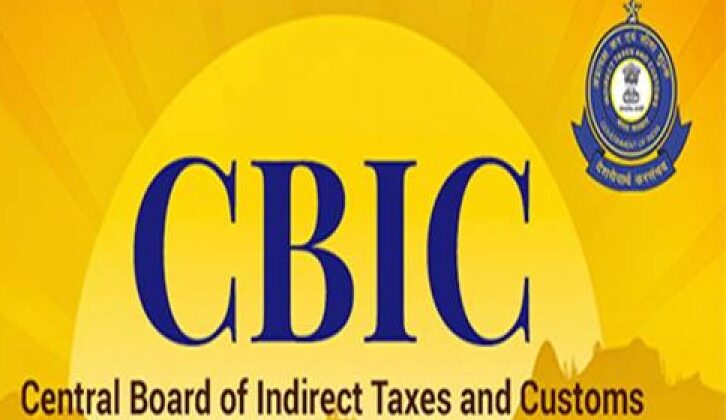
CBIC issued circular regarding the revision of All Industry Rates (AIRs) of Duty Drawback
NEW DELHI : The CBIC issued Circular No. 26/2023-Customs dated October 26, 2023, regarding the revision of All Industry Rates (AIRs) of Duty Drawback. These revisions were notified in Notification No. 77/2023-Customs (N.T.) dated October 20, 2023, and they will come into force on October 30, 2023.
The Government has notified the revised All Industry Rates (AIRs) of Duty Drawback, vide Notification No. 77/2023-Customs (N.T.) dated October 20, 2023 which will come into force on 30th October, 2023. The notification may be downloaded from Board’s website and carefully perused for details.
The salient features of the revised rates of Duty Drawback are as follows:
(i) Each tariff item in the Schedule, annexed to the above-mentioned Notification, has been provided with an AIR specified under column (4) with cap of Duty Drawback amount, wherever applicable, given under column (5). For claiming these AIRs, the relevant tariff item has to be suffixed with letter ‘B’. For example, for export of goods covered under tariff item (TI) 610901, the drawback serial number should be declared as 610901B;
(ii) The Notification also specifies, in the Table annexed thereto, AIRs on export of items covered under Chapters 61 and 62 of the Schedule (viz. articles of apparel and clothing accessories) made under Special Advance Authorization Scheme (para 4.04A of Foreign Trade Policy 2015-2020 and Foreign Trade Policy, 2023) in terms of Notification No. 45/2016-Customs dated August 13, 2016 and Notification No. 27/2023-Customs dated April 01, 2023. For claiming these AIRs, the relevant tariff item has to be suffixed with letter ‘D’, instead of the usual suffix ‘B’ mentioned above. For example, for export of goods under Special Advance Authorization Scheme covered under tariff item (TI) 610901, the drawback serial number should be declared as 610901D;
(iii) AIRs of Duty Drawback have been increased for certain items pertaining to chemicals (Chapter 29), finished and lining leather, leather articles and footwear (Chapter 41, 42 and 64), textiles and articles thereof made of silk/ wool/cotton/ MMF other than of nylon) (Chapter 50 to 63), carpets (Chapter 57), glass and glass ware (Chapter 70) and gold jewellery and silver jewellery/article (Chapter 71). The increase in AIRs is on account of various factors such as changes in duties, price (CIF) of imported inputs, FOB value of export goods, import intensity of inputs etc.;
(iv) AIRs have been rationalized for various items, including textiles and articles thereof made of nylon, on account of reasons such as decrease in BCD rate, changes in price (CIF) of imported inputs, FOB value of export goods, import intensity of inputs etc.;
(v) New tariff items have been introduced in the Schedule pertaining to sectors, viz. sugar confectionary (2 items), chemicals (21 items), pharma (2 items), plastic (7 items), leather articles and footwear (8 items), cotton and manmade fibers/fabrics (4 items), apparels (1 item), footwear (1 item), article of stone (1 item), arms and ammunition (2 items) and furniture (4 items). Description of some of the existing tariff items have been revised for better product differentiation and for enabling tax neutralization for specific products.
(vi) Appropriate caps of duty drawback amount have been provided wherever necessary to prescribe upper limit of duty drawback.
(vii) `Schaeffers Acid’ is currently classified for duty drawback purpose under Tariff Item (TI) 291501. In light of its proper classification under Customs Tariff Heading 2908, a separate entry for `Schaeffers Acid’ has been inserted under TI 290801. The duty drawback rate and cap amount for the item remain unchanged. The existing entry for Schaeffers Acid (TI 291501) has been deleted.
Representations have been received from various trade associations and export promotion councils stating that for products consisting of cotton and more than one manmade fibre, drawback was being denied under tariff item 610902-‘blend containing cotton and manmade fibre’ on the ground that the said heading refers only to “manmade fibre” in singular. In this regard, it is clarified that as per section 13 of the General Clauses Act, 1897′- words in singular shall also include the plural and vice versa’. In view of this, products containing cotton and more than one manmade fibre are squarely covered by the aforesaid tariff item 610902.
Commissioners are expected to ensure due diligence to prevent any misuse. The shipping bills with parameters considered to be sensitive should be handled with adequate care at the time of export. There is also need for continued scrutiny so as to prevent any excess drawback arising from mismatch of declarations made in the Item Details and the Drawback Details in a shipping bill.
Close watch should also be kept by the field formations regarding any changing trend of export valuation or drawback outgo in respect of goods where caps have been removed or increased as compared to the earlier caps. Any change in pattern should be immediately brought to notice of the Board. Commissioners may also inform, with appropriate data, the details of specific products where drawback cap needs to be reviewed or imposed.
Suitable public notice and standing order should be issued for guidance of the trade and officers. Any inconsistency, error or difficulty faced should be intimated at the earliest to the Board.
